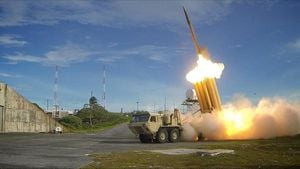Donald Trump has once again captured the attention of the nation, winning the 2024 presidential election. This victory is expected to have significant ramifications for the technology sector and U.S. policy moving forward. With Trump at the helm, tech giants are bracing for changes ranging from antitrust regulations to advancements and regulations within artificial intelligence (AI) and semiconductor industries.
Trump’s tenure has always been associated with daring moves and unpredictable decisions, leading many to wonder how the former president's policies will reshape the tech world. Though predictions are tricky—especially with someone like Trump, who can easily shift his stance depending on advisers—there are some policies and perspectives he’s made clear, particularly on issues related to AI, antitrust action, and relations with China.
One of the immediate outcomes of Trump's return could be the possible reshuffling of leadership at the Federal Trade Commission (FTC). There's speculation about whether Lina Khan, known for her aggressive stance against monopolistic practices, will continue her role under Trump. Khan, appointed by Biden, has pushed bold antitrust cases against major players like Google and Amazon, but with Trump’s promise to deregulate the tech sector, this aggressive enforcement might see significant changes.
Antitrust Actions Ahead
The case against Google, which has been characterized as having illegal monopolistic practices, was pursued during Trump’s last administration, and it could continue to be a point of contention. Although he’s voiced support for maintaining strong companies, Trump is also known for his aversion to what he perceives as excessive regulation. Recently, Trump described Google as “rigged,” reflecting his longstanding criticism of the company. This leads to questioning whether he’d continue the DOJ's antitrust lawsuits or seek to undermine their progress.
Trump's approach to the FTC could prompt the removal of Khan and alter the course of various litigation processes already underway. For example, if the current leadership maintains its stance, it would mean higher scrutiny on tech companies, which could involve restructuring or breaking up certain companies, especially those accused of anti-competitive behavior.
AI Under Scrutiny
Another pressing issue is the sphere of artificial intelligence. Under Biden, there were movements toward regulating AI with initiatives aimed at preventing biases and inaccuracies within AI systems. Trump, alongside stakeholders like Elon Musk, has opposed many of these regulations, branding them as radical leftist ideas. Trump indicated intentions to repeal the Biden administration’s 2023 executive order on AI, which sought tighter regulations on the technology.
Professor Sandra Wachter, from the Oxford Internet Institute, has warned of potential dangers stemming from Trump’s deregulation stance. She voiced concerns over the negative impacts on human rights, especially with AI being used for significant decisions—like hiring or loan approvals. Misinformation and toxicity flooded through these systems can worsen without stricter oversight, she cautioned.
Trump’s connections with allies within the tech industry, particularly Musk, could also dictate the future shape of tech policies. Musk, known for his ambitious ideas, may have opportunities to shape governmental policies directly, enhancing innovation at the expense of regulatory controls.
Chips and China: An Ongoing Concern
China remains another focal point. The manner in which Trump engages with China could reshape the global chip industry, which is already feeling the ramifications of trade tensions. Biden enacted measures to restrict chip exports to China, pushing for domestic manufacturing as part of the broader goal to reduce reliance on Chinese technology. Trump may escalate these tensions with even harsher trade policies, risking chronic disruptions for companies reliant on Chinese production, like Apple.
The prospect of Trump’s reduced support for Taiwan raises alarms across tech sectors. Taiwan plays a pivotal role as the global leader of semiconductor manufacturing, and any military conflict or political maneuvering might jeopardize chip supplies for the United States and allied firms.
Google and Big Tech's Future
Despite once being one of Trump’s favorite punching bags, it seems Google may find favor under his administration. Sundar Pichai, Google’s CEO, congratulated Trump following his election victory. Pichai’s response indicates a possible shift toward collaboration instead of confrontation, hinting at major adjustments within the tech ecosystem.
While Trump's administration is expected to create conditions more favorable to Big Tech, it remains to be seen how his leadership will balance these interests with nationalist pressures to prioritize domestic companies. For example, the pending Justice Department cases against Google concerning its digital monopoly and advertising practices could reflect conflicting objectives.
Trump’s skepticism toward limiting platforms like TikTok could also influence the broader regulatory strategy. He has veered from advocating for its ban to potentially easing restrictions, favoring engagement over combative crackdowns.
Conclusion
With Trump back in the White House, the tech sector is set for considerable change. The potential embrace of deregulation might ignite new innovation, but significant risks loom with this approach, particularly concerning competition and ethical technology practices. Balancing economic empowerment against regulations concerning big tech’s monopoly power shapes up to be pivotal as Trump’s 2.0 presidency begins, making the tech industry watch closely for the first signals of his shifting policies.



